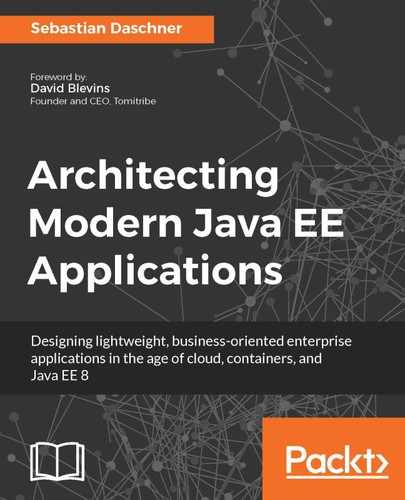Business use cases cannot only be invoked from the outside, for example, by a HTTP request, but also emerge from the inside of the application, by a job that runs at a defined time.
In the Unix world, cron jobs are a well-known functionality to trigger periodic jobs. EJBs provide similar possibilities using EJB timers. Timers invoke business methods based on a recurring pattern or after a specific time. The following shows the definition of a scheduled timer that times out every 10 minutes:
import javax.ejb.Schedule;
import javax.ejb.Startup;
@Singleton
@Startup
public class PeriodicJob {
@Schedule(minute = "*/10", hour = "*", persistent = false)
public void executeJob() {
// this is executed every 10 minutes
}
}
All EJBs, singleton, stateful, or stateless beans can define timers. However, in the majority of use cases it makes sense to define timers on singleton beans. The timeout is invoked on all active beans and it usually is desired to invoke the scheduled job reliably; that is, on a singleton bean. For the same reason this example defines the EJB to be active during application startup. This guarantees that the timer is executed from the beginning.
Timers can be defined as persistent, which extends their lifetime beyond the JVM life cycle. The container is responsible for keeping timers persistent, usually in a database. Persistent timers that would have been executed while an application is unavailable are triggered at startup. This also enables the possibility to share timers across multiple instances. Persistent timers together with corresponding server configuration are a straightforward solution for business processes that need to be executed exactly once across multiple servers.
The timers that are automatically created using the @Schedule annotation are specified using Unix-like cron expressions. For more flexibility, EJB timers are defined programmatically using the container-provided timer service that creates Timers and @Timeout callback methods.
Periodic or delayed jobs can also be defined outside EJB beans using the container-managed scheduled executor service. A ManagedScheduledExecutorService instance that executes tasks after a specified delay or periodically is injectable into managed beans. Executing these tasks will happen using container-managed threads:
@ApplicationScoped
public class Periodic {
@Resource
ManagedScheduledExecutorService mses;
public void startAsyncJobs() {
mses.schedule(this::execute, 10, TimeUnit.SECONDS);
mses.scheduleAtFixedRate(this::execute, 60, 10, TimeUnit.SECONDS);
}
private void execute() {
...
}
}
Invoking startAsyncJobs() will cause execute() to run in a managed thread, 10 seconds after the invocation and continuously, every 10 seconds, after an initial minute has passed.
